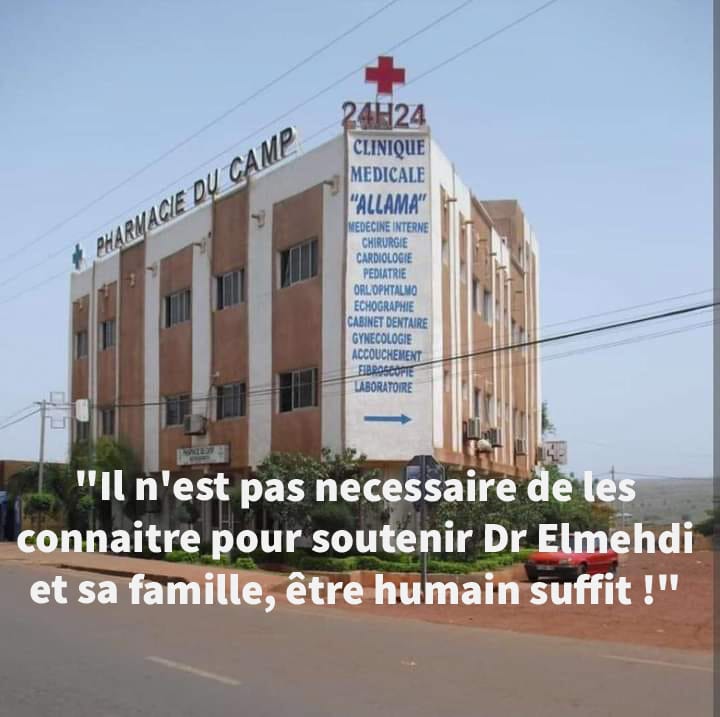
In February 2012, after the debacle of the Malian army in the north, which abandoned the northern regions to retreat to the south after being chased there by the Tuareg rebel group MNLA. Meanwhile, Bamako was boiling over as a coup was orchestrated to depose President Amadou Toumani Touré in March 2012 by Captain Haya Sanogo. As is customary in Mali, whenever a rebellion breaks out in the north, the light-skinned population is targeted and subjected to either exactions or looting. This is what happened in March 2012 at the medical clinic of Dr. Elmehdi Ag Hamahady. Indeed, the crowds of young people from the garrison town of Kati in anger and ecstasy went to the medical clinic to ransack it, take what they could and set fire to the rest. Everything was destroyed. This colossal investment of millions of CFA francs was ransacked and set on fire by the people whom the structure used to treat.
For years, Dr. Elmehdi Ag Hamahady and his family have been raising their voice everywhere to ask for repairs, but without success. The building that once housed the clinic was sold at auction last week by the Bank of Africa.
Why is this episode important for us to be interested in ?
Firstly : this case is not the first of its kind to be suffered by light-skinned communities in the north and south of Mali.
Secondly, health facilities are not military objectives, nor are they property with religious or ethnic connotations. Insofar as the Allama medical clinic has had to treat Malians in general and the inhabitants of Kati without distinction of race or religion.
Thirdly : it is to show the world that the fight of the Tuaregs and Arabs is legitimate. That the central state in Bamako makes a clear distinction between its citizens. Because the injustice done to the family of Dr. Elmehdi Ag Hamahady has never been repaired. The state and human rights organizations have never supported him in his quest for justice and reparation.
Finally, this tragedy is neither the first nor the last to be experienced by these communities, who never manage to be integrated into the machinery of the state.
INTERVIEW QUESTIONS FOR DR HAMADY / ALLAMA MEDICAL CLINIC
Question 1: Dr. Hamady, can you give us an overview of your professional experience as a doctor? Do you practice medicine in France at the moment?
Answer: I am a Malian state doctor, practicing for more than 20 years in Mali. After the dramatic event of 2012, I left for France to live there in peace and quiet.
I do services from time to time.
Question 2: Regarding your clinic in Kati, could you list the specialties? Is there a specialty in which you have been most successful and why?
Answer: The specialties of the Allama clinic were:
- Pediatrics
- Internal medicine
- Cardiology
- Neurology
- Surgery
- Ultrasound
Question 3: Approximately how many doctors and nurses did you have? Did the belong to all ethnic groups? Did you have foreign staff?
Answer: At the time, we had about 8 doctors who are from all ethnic groups in Mali. No, we did not have foreign staff.
Question 4: Can you tell us what were the main medical needs of the local population of Kati? Did you have patients who came to the clinic from other villages / towns in the same circle?
Answer: The main needs of the population in terms of care are the availability of drugs at the lowest cost, the subsidy of consultation fees to harmonize the income of the populations with the cost of care. Adequate infrastructure, modernization of technical facilities, advanced training of doctors and nurses. So that everyone can heal themselves. Obviously, at the Allama medical clinic, we receive people from all over the surrounding villages of Kati and even Bamako.
Question 5: Have you witnessed resistance or lack of confidence in medical treatment from other ethnic groups (example: Peul, Bambara, etc.)?
Answer: No, that never happened
Question 6: Have you ever moved to deal with members of terrorist groups or their families? If so, what kind of treatment did you provide? Women’s maternal health, for example, or the treatment of wounds and wounds?
Answer: No, the Allama clinic was vandalized long before the Islamist invasion in Mali.
Question 7: We called you because we would like to give a voice to the terrible incident that happened in your clinic in Kati. Do you have an explanation as to why you were targeted?
Answer: Frankly, I think we were targeted because of our ethnicity, the color of our skin. This is not the first time, even in 1990, we were victims of the same acts of vandalism and narrowly escaped certain death.
Question 8: Do you think that health care providers in Mali are in danger? If so, can you explain why?
Answer: No, I don’t think so.
Question 9: How would you describe the current security situation in Kati and the surrounding area? Do you think the locals need more than one clinic?
Answer: It has been almost 10 years since I took refuge in France, I cannot tell you what is happening there now.
Question 10: Given your experience and your knowledge of the health system in Mali, what can you tell us about the current health infrastructure in the areas controlled by JNIM (for example: Mopti and Menaka areas).
Answer: As I said, I am out of the country, I see the information in the same way as the foreigners do. I have no idea how it is today in Mali.